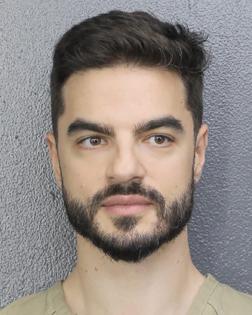Man accused of killing wife in Spain takes his own life in Miami jail cell, attorney says
Published in News & Features
MIAMI — David Knezevich, the Fort Lauderdale man charged with killing his estranged wife in Spain early last year, took his own life on Monday morning while in custody at the Federal Detention Center in Miami, according to his defense attorneys.
Knezevich, 37, who was awaiting trial in Miami federal court on charges of kidnapping and killing Ana Knezevich Henao in Madrid, was found dead of an apparent suicide in his cell.
His defense attorney, Jayne Weintraub, said she learned about her client’s death from federal prosecutors on Monday morning and had a Zoom call with them and U.S. District Judge Kathleen Williams to discuss it later in the day. The FBI is investigating his death.
“It’s just terrible,” Weintraub said, adding that she and another defense lawyer had met with Knezevich at the detention center on Sunday after a court hearing on Friday. “As always, he was very appreciative and polite.”
Weintraub, along with defense lawyers Christopher Cavallo and Bruce Zimet, issued a statement on Monday afternoon, saying, “They were devastated to learn of this news.”
“We sincerely hope that an appropriate and prompt investigation will be conducted,” they said.
With his death, prosecutors with the U.S. Attorney’s Office are expected to dismiss the charges against him.
Although prosecutors decided in January that they would not pursue the death penalty, Knezevich still faced up to a life sentence if convicted at his trial, which had been scheduled for mid-June.
In December, Knezevich had pleaded not guilty to charges of kidnapping and killing his wife, Ana, 40, on Feb. 2, 2024, the date she was reported missing from her Madrid apartment. Knezevich, who was initially arrested last May at Miami International Airport on a kidnapping charge, was charged anew with kidnapping resulting in his wife’s death.
He was also charged with foreign domestic violence resulting in death and foreign murder of a U.S. national, according to the amended indictment.
Ana’s body was never found, which made the international murder case a challenge for FBI agents and prosecutors who had built a largely circumstantial body of evidence against Knezevich.
Knezevich, who had been held at the Miami Federal Detention Center since his arrest after he was deemed a flight risk to his native Serbia or elsewhere, was denied a bond from the onset. The additional charge of kidnapping resulting in death marked a dramatic shift in the case surrounding Ana’s disappearance from her Madrid apartment.
Fight over millions in Broward properties
Knezevich, who operated a tech business, owned millions of dollars in Broward County residential real estate with his wife, a native of Colombia, that they had acquired over the course of their 13-year marriage. They were fighting over these and other assets when she left for Spain in late December 2023.
Prosecutors noted the defendant reported to the court’s probation office that his estimated net worth was about $2.5 million after selling seven residential properties in Broward for about $6.7 million between December 2023 and February 2024, before his estranged wife’s disappearance in Spain.
Knezevich was accused of leaving Miami in late January 2024 for Serbia, where prosecutors say he rented a car to track down his wife in Spain.
The FBI said it suspected he carried Ana Knezevich’s body in a suitcase out of her Madrid apartment building on the evening of Feb. 2, 2024, citing security-camera footage of him exiting the elevator.
In August, the FBI joined Spanish and Italian authorities in a search for her corpse in the woods north of Vicenza, Italy, where a GPS alert on the husband’s rented Peugeot 308 suggested he took a detour there on his return trip from Spain to Serbia.
The wife’s corpse, however, was not found.
“What we do know is that the evidence supports that she was killed between Spain and Serbia,” Assistant U.S. Attorney Jessica Obenauf said during a hearing in January before Judge Williams. The judge prodded prosecutors to turn over fingerprint, cellphone, photo, video and other evidence from the FBI and Spanish National Police to Knezevich’s defense team.
For months, the FBI had been coordinating its investigation with the Spanish authorities, gathering suspicious security-camera footage of Knezevich’s presence in a Madrid hardware store and at her apartment just before her disappearance, as well as fabricated text messages and stolen license plates on a rental car suggesting a cover-up.
However, authorities found no evidence of blood traces or a struggle in the estranged wife’s Madrid apartment after she was reported missing.
_____
©2025 Miami Herald. Visit miamiherald.com. Distributed by Tribune Content Agency, LLC.







Comments